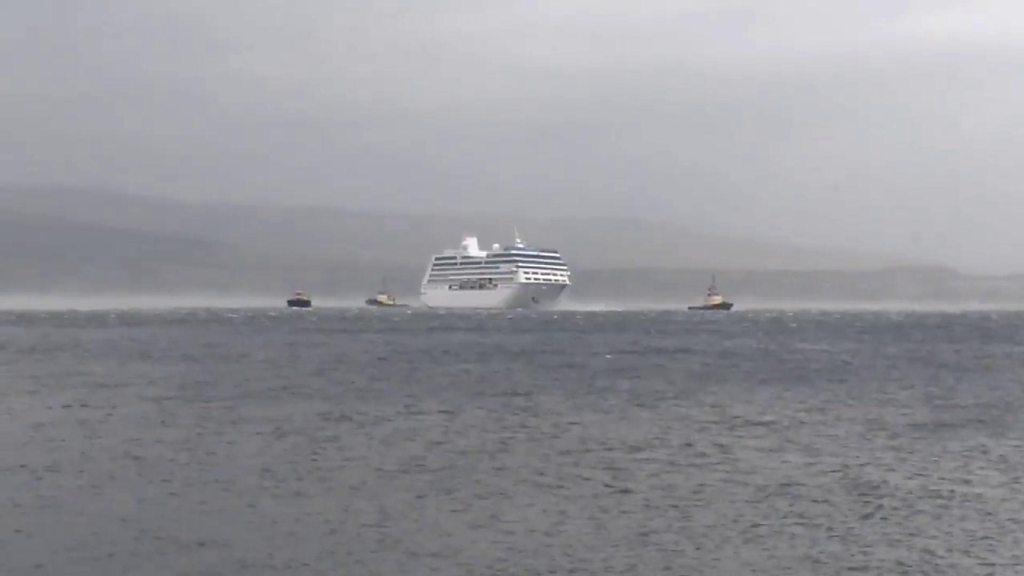Storm Ali leaves power cuts and travel chaos in its wake
- Published
Severe gales as Storm Ali hits Scotland
Thousands of homes are still without power as Storm Ali batters parts of Scotland.
Rail travel has been severely hit, with road and ferry travel also disrupted after a day of high winds and rain.
A gust of 102.2mph was recorded on the Tay Road Bridge, which has been closed to traffic for much of the day.
All train services out of Edinburgh Waverley, Glasgow Queen Street and Glasgow Central's high level have been suspended.
In Glasgow, a cyclist was been taken to hospital after he was struck by a falling tree branch.
Scottish and Southern Electricity Networks say they have restored power to 16,000 homes but a further 4,900 are still without electricity.
The areas most affected are Perthshire, Aberdeenshire, Angus and "pockets of Argyll".
Earlier, SP Energy Networks, which covers the south of Scotland, said 58,000 had lost supplies earlier in the day but 30,000 have since been reconnected.
Hundreds of passengers queued at Buchanan Street Station in Glasgow - many for more than an hour
Scotrail's managing director Alex Hynes said a 'minority' of trains were running across Scotland because of the storm conditions making the lines unsafe.
"There is major disruption across the Scottish network," he said.
"Storm Ali has blocked many lines and routes but we are working as fast as we can to reinstate rail services across the country.
"Network Rail engineers are working hard to clear the lines so it is safe to run trains again."

Rush hour snapshot
TRAINS - Most high level services in Glasgow and Edinburgh Waverley remain suspended.
PLANES - More than 40 cancellations at Glasgow Airport, some flights cancelled in Edinburgh also.
AUTOMOBILES - Tay Road Bridge closed, Forth Road Bridge open only to single deckers, no double deckers allowed on Queensferry Crossing. A9 Dornoch and Kessock Bridges closed to high-sided vehicles. Road closures in many areas due to debris and fallen trees.

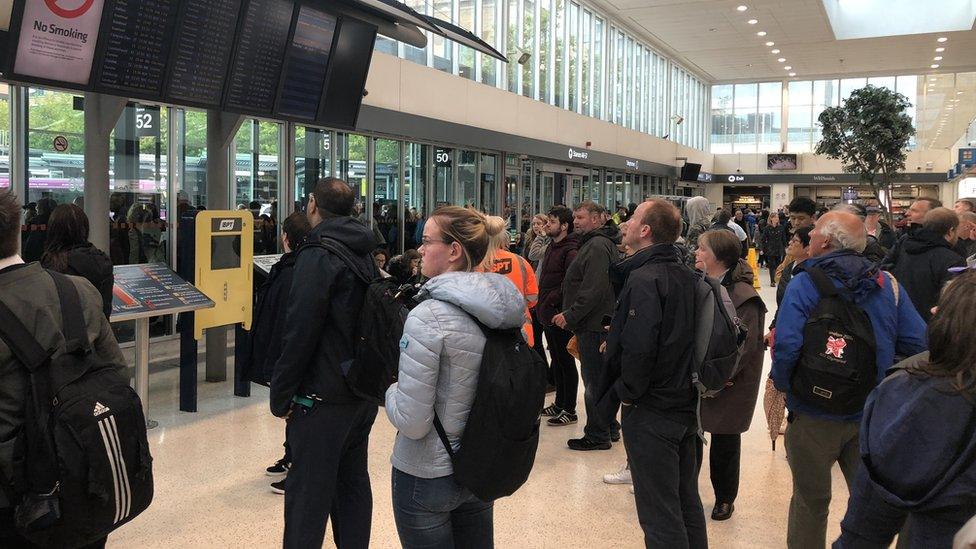
Buchanan Street bus station filled up when trains were cancelled
Queues formed at bus stations ahead of the evening rush hour as commuters struggled to find transport.
Flood threat
The Scottish Environment Protection Agency has increased the number of flood warnings to nine; most of them for rivers in Tayside.
There are also warnings of flooding between Ayr and Troon and along Strathglass in the Highlands.
The agency has also issued more general flood alerts for five areas - Tayside, Ayrshire and Arran, Argyll and Bute, Dumfries and Galloway and West Central Scotland.
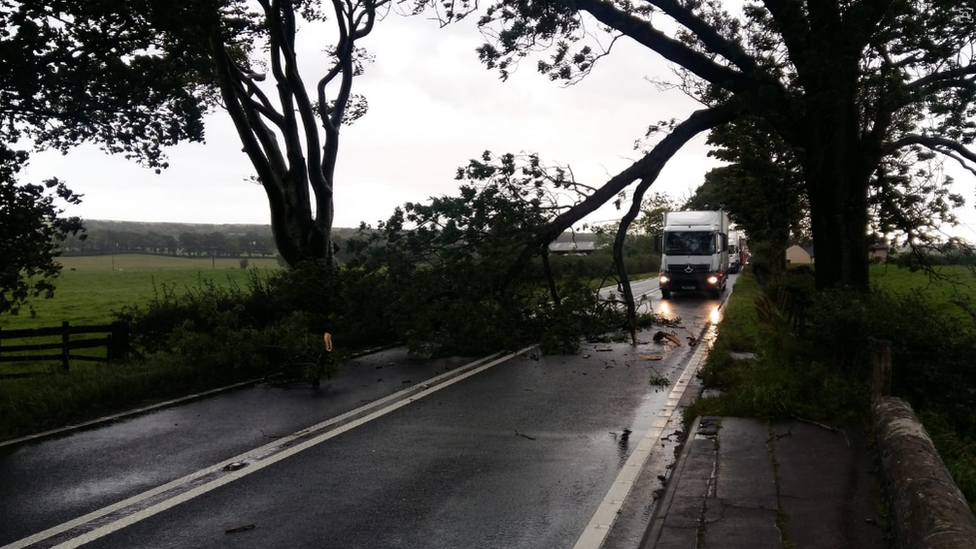
A "major incident" was been declared in Dumfries and Galloway with emergency workers and council staff dealing with "multiple incidents".
Schoolchildren in the region were banned from walking home without their parents after reports that some had been injured by flying debris.
Falling masonry also caused problems in Glasgow, Edinburgh and Dundee.
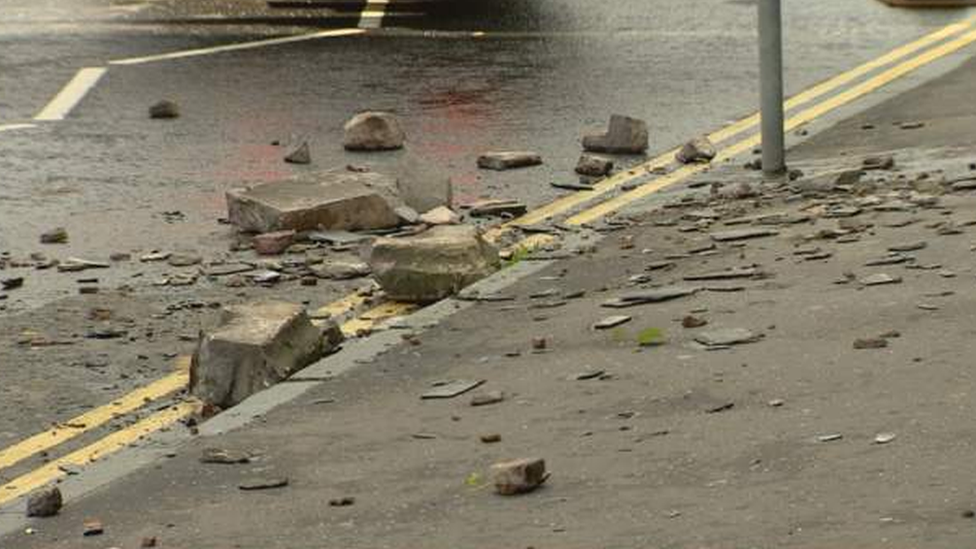
Fallen masonry at Perth Road Dundee
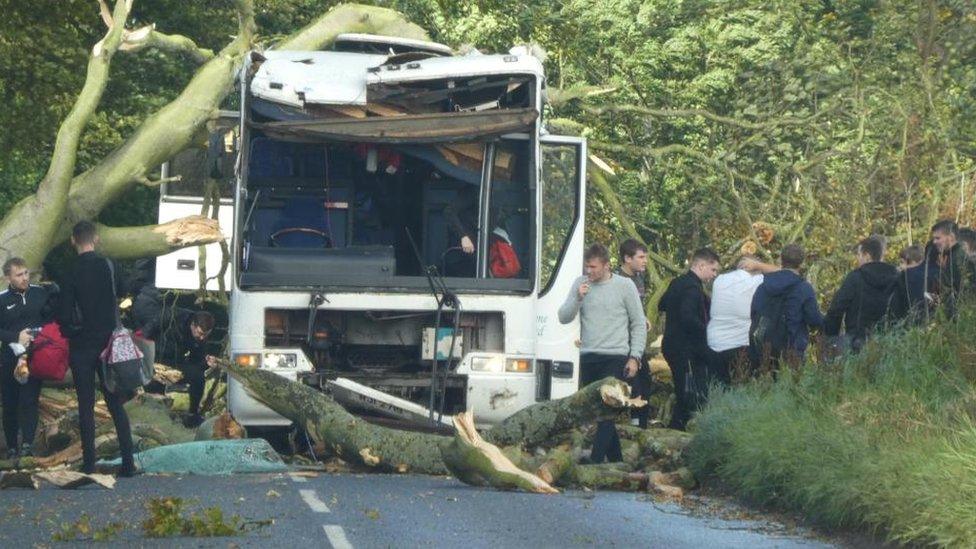
A tree hit the team bus but fortunately no one was hurt
Footballers from the University of Dundee had a narrow escape after a tree fell on their bus en route to a game.
The coach had a number of squads from the Dundee University Association Football Club on board and was about four miles from their destination in St Andrews when the tree struck.
Team member Declan Dundas told the BBC: "I drove to the game with my friend. But the guys on the bus said it was absolute havoc.
"All the boys came out fine but one boy had a slight injury where he hurt his head. He insisted on playing the game and actually played well.
"I think everybody was initially just a bit shocked and taken back but St Andrews Uni were helpful in delaying kick off and the game went ahead."
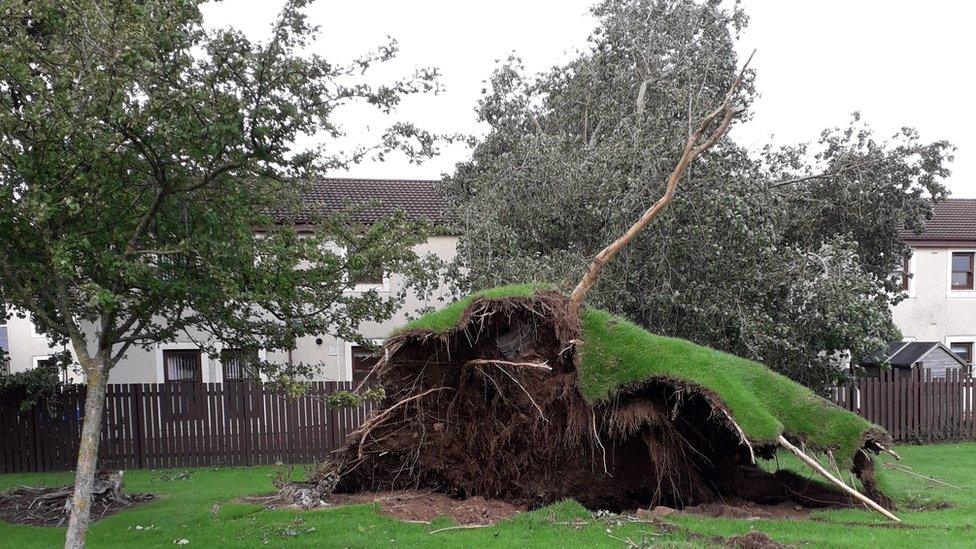
An uprooted tree in Prestwick gets uncomfortably close to houses
One person was been injured after being blown over by high winds outside the new V&A Dundee museum. The building was closed to new visitors this afternoon as a result of the weather.
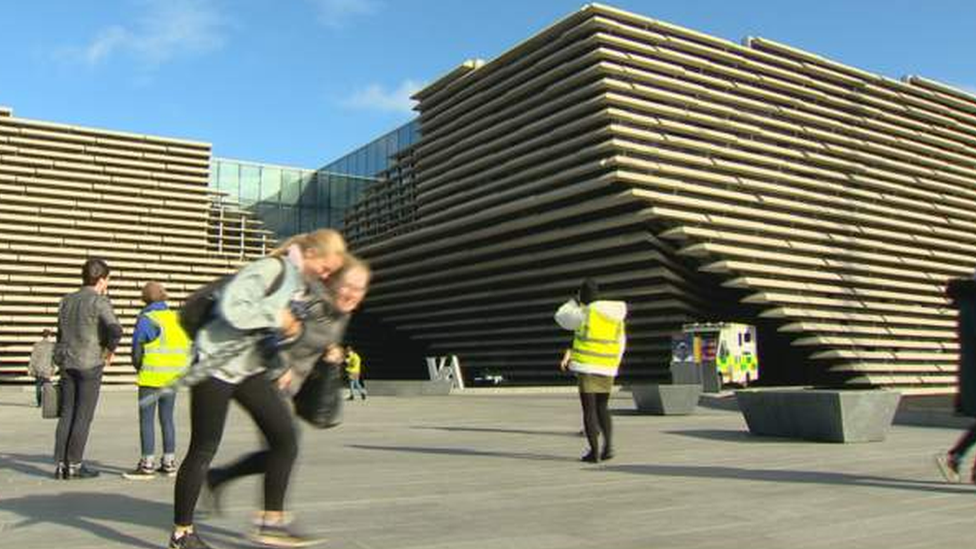
The newly-opened V&A Dundee was closed due to high winds

At a glance: Wind and flood warnings
Wind warnings cover central, Tayside, Fife, Grampian, south west, Lothian and Borders and the Strathclyde areas
A gust of 102.2mph was recorded on the Tay Road Bridge
More than 32,000 homes left without power
ScotRail services across much of central Scotland suspended
Fallen trees close roads in Glasgow, Dumfries and Galloway and North and South Lanarkshire
Flood warnings issued for between Ayr and Troon and along Strathglass in the Highlands
Flood alerts in place for Tayside, Ayrshire and Arran, Argyll and Bute, Dumfries and Galloway and West Central Scotland.

The Met Office weather warnings, external, included an amber "be prepared" alert which was due to expire at 18:00 on Wednesday.
The warning covered central, Tayside, Fife, Grampian, south west, Lothian and Borders and the Strathclyde areas.
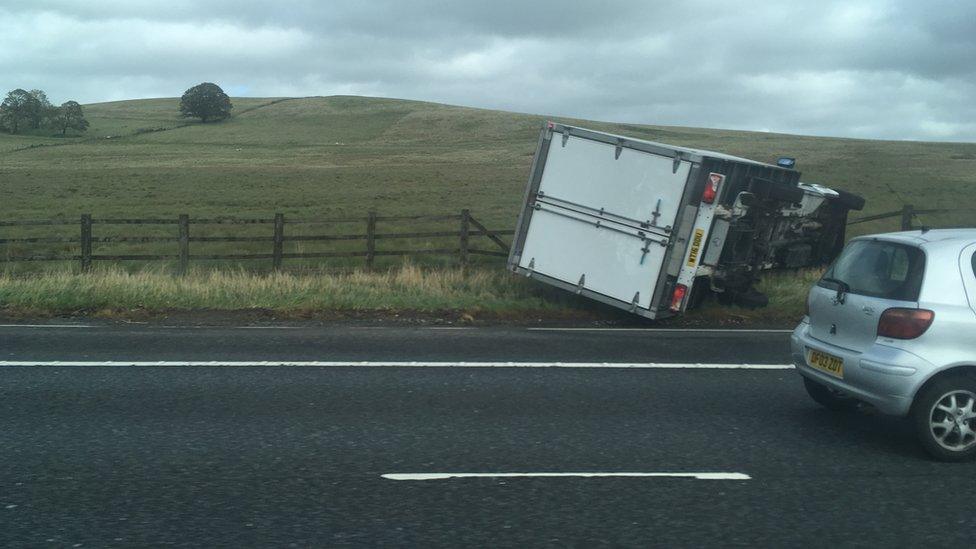
A lorry overturned on the M74 near Abington services
A yellow "be aware" warning for high winds covered the whole of Scotland.
Emergency services were called the Parkhead area of Glasgow shortly after midday when a cyclist was hit by a falling tree branch.
Police Scotland said it happened in Springfield Road, and the man was taken to Glasgow Royal Infirmary for treatment. There was no immediate word on his condition.
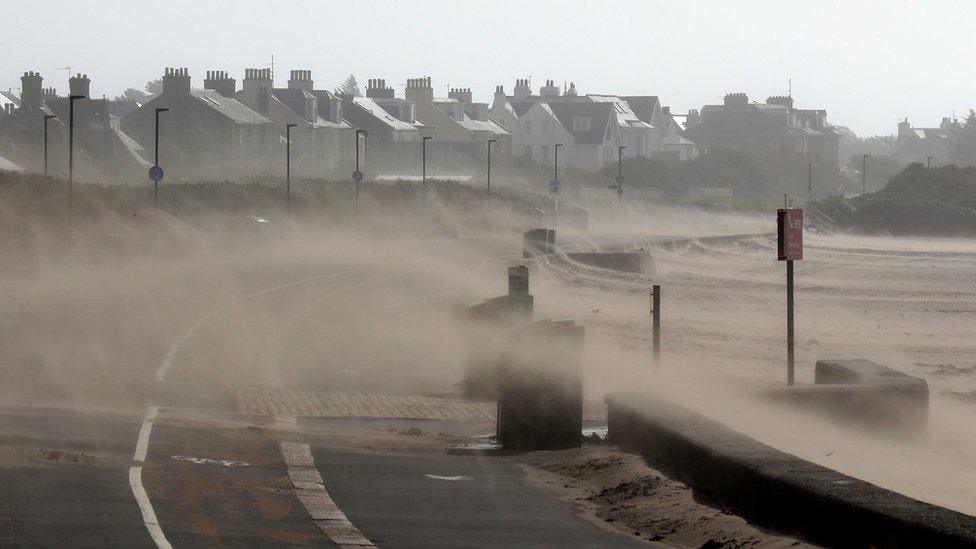
Troon beach in South Ayrshire felt the force of Storm Ali
In Edinburgh, part of Princes Street was closed after damage to the roof of the Topshop building. A section of South Bridge Street was also shut after lead fell from the Tron Kirk. There were no reports of injuries.
A lorry caught by high winds overturned on the M74 just north of the Abington services.
A freight train was derailed on the Highland Main Line after striking fallen branches.
The incident happened at about 01:40 near Culloden in Inverness during a spell of high winds ahead of Storm Ali's forecasted bad weather.
NetworkRail Scotland said a north-bound train had struck a tree near Blair Atholl. There were no immediate reports of any injuries and the train returned to Blair Atholl, sending passengers on to Inverness by bus.
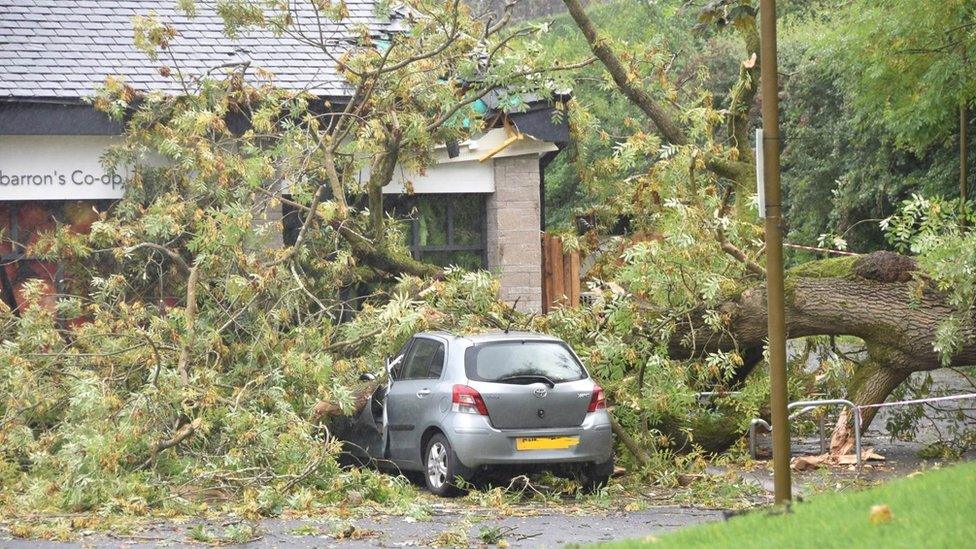
A car was crushed by a fallen tree in Cambusbarron, near Stirling
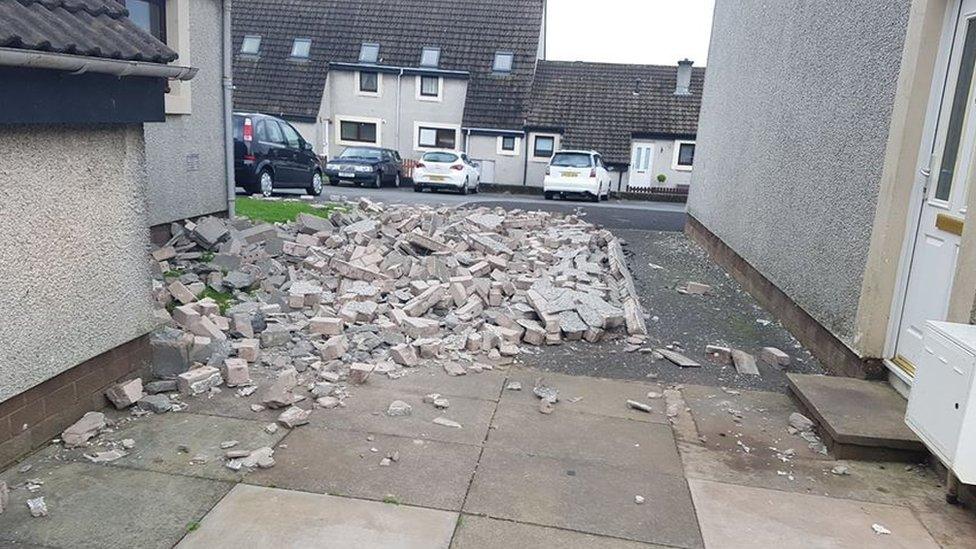
A major incident has been declared in Dumfries and Galloway
Five hundred cruise passengers and crew were stranded in Greenock after severe weather broke their ship's mooring lines.
Tugs were called in to help the Nautica try and berth. No-one on board, or on shore, has been injured.


Storm Ali travel news for Scotland
For the latest on the situation on the roads, visit BBC Scotland Travel, external
You can also follow the BBC Scotland severe weather Twitter list, external, and BBC Scotland Weather, external
Alternatively, for regular local travel updates listen live to BBC Radio Scotland.
Below are a number of other traffic information sources for road, rail and ferry services.

P&O and Stena Line suspended all morning sailings out of Cairnryan, while CalMac has also cancelled a number of sailings in the Western Isles.
Ali is first on the storm names list for 2018-19, announced by the Met Office and Met Eireann, which has run the Name Our Storms scheme for four years.
Historic Environment Scotland said it was not safe to open Edinburgh Castle due to the high winds forecast.
Several of its other properties, including Kisimul Castle, Cardoness Castle, Iona Abbey, Huntly Castle, Inchmahome Priory and Lochleven Castle, were closed.
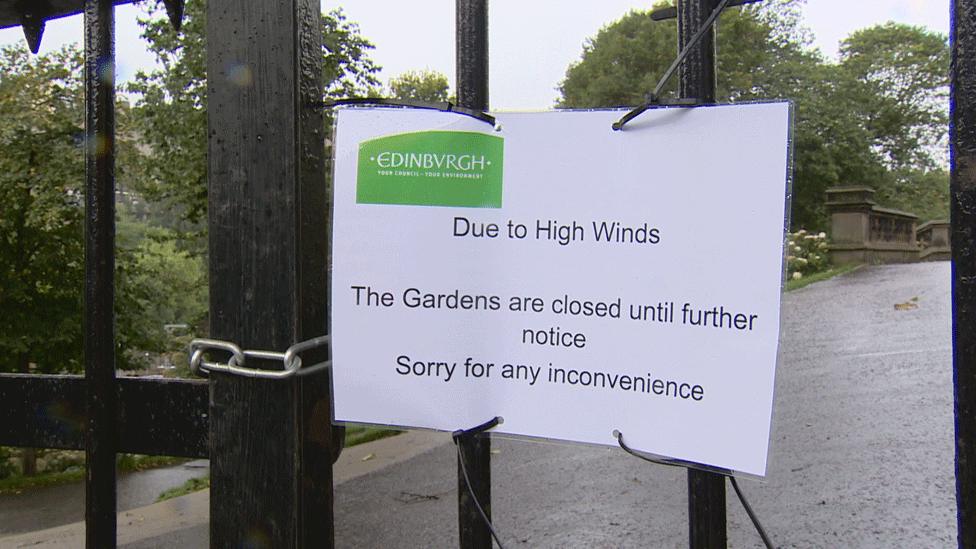
Princes Street Gardens in Edinburgh were closed because of the weather conditions
Allow X content?
This article contains content provided by X. We ask for your permission before anything is loaded, as they may be using cookies and other technologies. You may want to read X’s cookie policy, external and privacy policy, external before accepting. To view this content choose ‘accept and continue’.

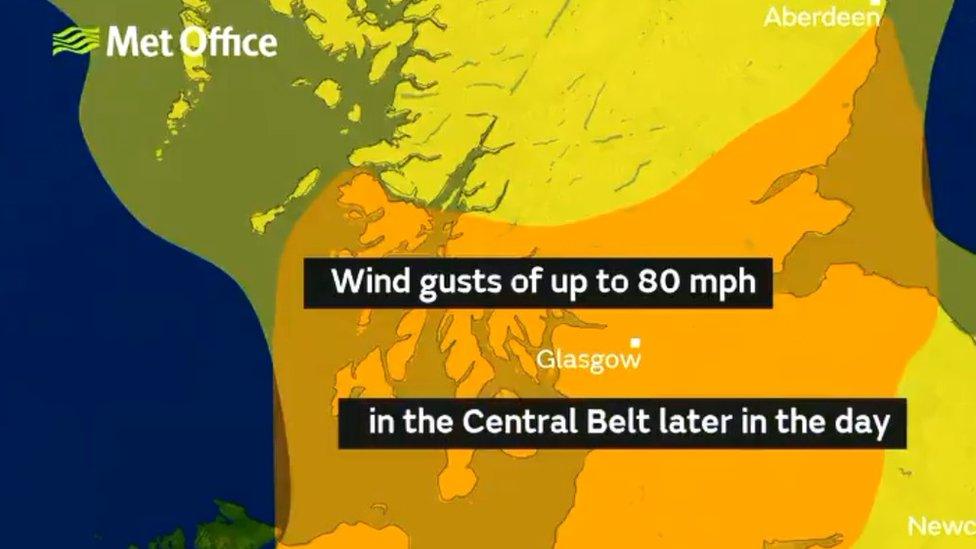
The Met Office issued amber and yellow warnings
Scotland's transport secretary, Michael Matheson, said the Scottish government's resilience room would be active throughout Wednesday to monitor the wider impact of Storm Ali.
'Evening peak'
Stein Connelly from Transport Scotland told the BBC: "We've been doing a lot of planning on this and have been working closely with the Met Office.
"We have called in our operating companies to look at what resources they have available. They have specialised resources - people trained with chainsaws and pumps to clear out drains and make sure there is no flooding.
"The amber warning covers from Dundee to the south. It covers the morning and evening peak, with the disruption expected to increase as the day goes on.
"Our advice is, as always, plan your journey, be prepared and drive to the conditions."

What the weather warning colours mean
Yellow: Severe weather expected. Yellow means you should plan ahead thinking about possible travel delays, or the disruption of your day-to-day activities.
Amber: Be prepared for disruption. There is an increased likelihood of bad weather affecting you, which could potentially disrupt your plans and possibly cause travel delays, road and rail closures, interruption to power and the potential risk to life and property.
Red: Extreme weather is expected. Red means you should take action now to keep yourself and others safe from the impact of the weather. Widespread damage, travel and power disruption and risk to life is likely. You must avoid dangerous areas and follow the advice of the emergency services and local authorities.
- Published19 September 2018
